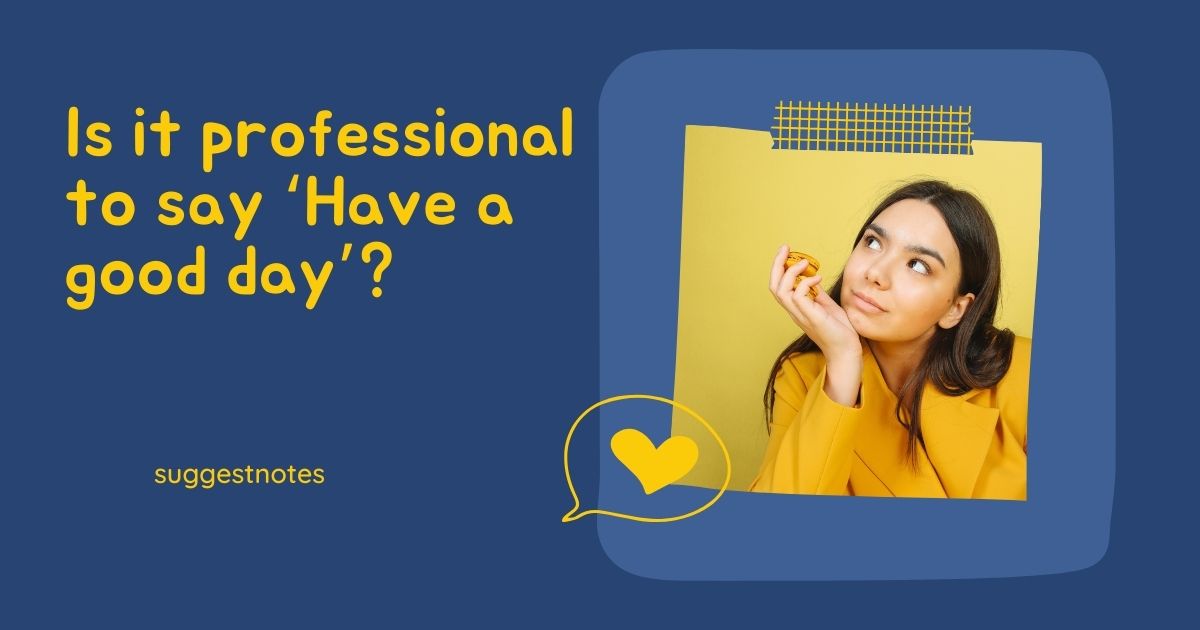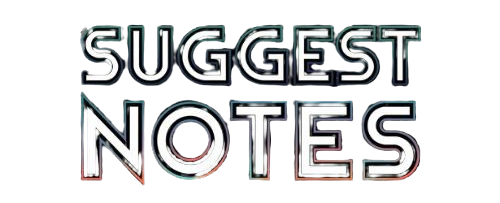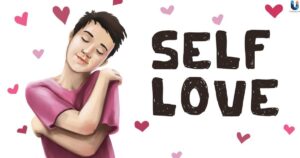“Have a good day” just doesn’t seem to cut it. Maybe you want to add a bit more personality, or perhaps you’d like to switch up your phrasing to avoid sounding robotic.
Whatever the reason, having some fresh alternatives in your back pocket can be a real conversation enhancer.
In this post, we’ll explore a variety of expressions you can use in place of the classic “Have a good day.” From the cheerful and upbeat to the quirky and memorable, we’ve got you covered with a range of substitutions to breathe new life into your farewells.
Is it professional to say ‘Have a good day’?

“Have a good day” is generally considered professional and appropriate. While it is a common and straightforward phrase, it conveys politeness and well-wishes without being too casual or overly formal. It strikes a balanced, inoffensive tone suitable for professional settings and interactions with colleagues, customers, or clients.
However, many may feel that it lacks warmth or creativity, especially when used repeatedly. Finding alternative farewell expressions can keep your goodbyes feeling fresh and engaging, enhancing the warmth of your communication.
What to Say Instead of “Have a Good Day”

Here are 10 alternative ways to say “Have a good day”:
- Pleasant day to you.
- Have a wonderful day.
- Enjoy your day.
- Wishing you a lovely day.
- Hope your day goes well.
- May your day be filled with joy.
- Have a great day.
- Make the most of today.
- May your day be bright.
- Wishing you all the best for today.
1. Pleasant day to you (Formal)
“Pleasant day to you” serves as a formal and somewhat traditional alternative to “Have a good day.” This phrase carries a tone of cordiality and old-world charm, making it suitable for both personal and professional contexts where a touch of formality is appreciated.
This expression subtly conveys that you care about the day the listener is going to have while also keeping a polite distance. For example, in a professional email, you might close with, “As we continue to explore these opportunities, a pleasant day to you.
” This phrasing reinforces professionalism while still wishing well.
On a personal note, you could say, “It was lovely seeing you at the gala; a pleasant day to you.” This blends affection with a refined closing.
2. Have a wonderful day (Cheerful)
“Have a wonderful day” is a cheerful and slightly more enthusiastic version of “Have a good day.” This phrase adds warmth and optimism, suggesting not just a good day but a wonderful one.
It works well in both casual conversations and customer service interactions, where conveying positivity enhances social exchanges.
The word “wonderful” elevates the standard farewell, making the recipient feel valued and genuinely cared for.
For instance, a café barista might hand over your coffee with a smile, saying, “Have a wonderful day.”
This leaves you with a lasting positive impression. In a professional email, you might wrap up with, “Thank you for your quick response; have a wonderful day!” This extends good cheer and appreciation.
3. Enjoy your day (Casual)
“Enjoy your day” is a casual and inviting expression, perfect for encouraging someone to take pleasure in their day’s activities. It implies a sense of freedom and personal enjoyment, making it ideal for conversations with friends or in informal settings.
This phrase is particularly suitable when you know the other person has plans they are looking forward to, reinforcing the idea of personal enjoyment. It’s commonly used in more laid-back, service-oriented interactions.
For example, a tour guide might conclude their tour by saying, “We’ve covered everything on the map; enjoy your day exploring the city.”
Alternatively, when sending a friend off on a vacation, you might say, “I’m so excited for you to enjoy your day in Paris.”
4. Wishing you a lovely day (Thoughtful)
“Wishing you a lovely day” is a thoughtful, gentle alternative that conveys a sense of wishing well with a touch of elegance. It’s often used when you want to impart a sense of calm and beauty in your farewell.
This expression is particularly effective in formal or heartfelt communications, like greeting card messages or when addressing someone who appreciates thoughtful gestures.
It can personalize interactions, making the recipient feel that their well-being is being considered.
For instance, if you were to send a message to a neighbor recovering from illness, you might write, “Saw your flowers blooming beautifully this morning, wishing you a lovely day.”
In a more personal context, saying, “Wishing you a lovely day” after a phone call reinforces your affection and good wishes.
5. Hope your day goes well (Supportive)
“Hope your day goes well” is a supportive phrase that conveys hope for success or smooth proceedings throughout the day.
It’s particularly suitable when the person you’re talking to faces a day filled with activities, challenges, or important tasks.
This expression is versatile and can be used in both professional and personal settings to show encouragement and support.
It is especially effective when you are aware of specific challenges the individual might be facing, adding a layer of empathy to your communication.
For example, before a big presentation, telling a colleague, “I’ve seen how hard you’ve worked on this; hope your day goes well!” can boost their confidence.
Similarly, when your partner has a long day ahead, a simple morning text saying, “Big day today, hope your day goes well,” shows support and personal interest in their well-being.
6. May your day be filled with joy (Inspirational)
“May your day be filled with joy” is an inspirational expression that casts a hopeful and positive light on the day ahead. It’s especially suitable for conveying more profound emotional support and optimism, making it a fantastic choice for special occasions or when someone needs a boost.
This phrase shines in personal interactions where you have a close relationship and are aware of the other’s need for encouragement. It beautifully sets a tone of heartfelt good wishes in both verbal and written forms.
For example, on a friend’s birthday, you might say, “May your day be filled with joy and wonderful surprises!” In a more daily context, a text to someone who’s been going through tough times might include, “Just thinking of you this morning may your day be filled with joy.”
7. Have a great day (Upbeat)
“Have a great day” is an upbeat and widely used alternative that serves as a robust, enthusiastic version of “Have a good day.” This expression is versatile and suitable for both personal and professional contexts, where it adds lively energy to the conversation.
It’s a great fit for casual conversations with acquaintances or colleagues, helping to foster a positive environment.
This phrase can be particularly effective in customer service, where conveying an energetic and positive attitude is crucial.
For instance, after a successful service appointment, a technician might say, “Have a great day, and let us know if you need further assistance!” Similarly, a team leader might end a morning briefing with, “Alright team, let’s get to it and have a great day!”
Related Guide:
10 Other Ways To Say “Please Disregard My Previous Email” (With Examples)
8. Make the most of today (Motivational)
“Make the most of today” is a motivational expression that encourages taking active steps toward making the day productive or enjoyable.
It implies a proactive approach to daily activities and is ideal for inspiring someone to seize opportunities.
This phrase is particularly impactful when addressing individuals who are working on personal goals or projects, as it emphasizes action and effort.
It’s also fitting in educational or coaching contexts, where encouraging positive behavior and initiative is essential.
A coach might motivate their team with, “Make the most of today every moment on the field counts!”
Or, you could encourage a friend who’s been procrastinating on a project by saying, “You’ve got to make the most of today!”
9. May your day be bright (Cheerful)
“May your day be bright” is a cheerful and somewhat poetic way to wish someone a good day. This expression conveys optimism and the hope that the day will be filled with light and happiness.
It’s especially appropriate when you want to convey warmth and care, perhaps when someone is feeling down or facing a tough time.
This phrase can be effectively used in both personal and professional communications where a touch of warmth can make a big difference.
For example, starting a team email with, “Good morning, everyone may your day be bright and productive!” can uplift the mood.
On a more personal note, you might text someone who’s been feeling low, “Sending you love and light may your day be bright.”
10. Wishing you all the best for today (Encouraging)

“Wishing you all the best for today” is an encouraging phrase that packs a powerful sentiment of support and goodwill. It’s perfect for when someone is facing significant challenges or opportunities, such as a job interview, an exam, or a new endeavor.
This expression is broadly applicable across various contexts, offering a strong sense of backing and best wishes.
It works well in both professional emails and personal messages, where emphasizing your support can have a significant impact.
For example, before a major presentation, you might reassure a colleague, “Wishing you all the best for today, you’re going to be fantastic.”
Or, in a morning text to a friend on the day of a big move, you could write, “Big day ahead wishing you all the best for today. Can’t wait to hear all about it!”
FAQs
What are some other alternatives to ‘Have a good day’?
Some other options include “Take care,” “Be well,” and “See you soon.” These phrases also show care and consideration.
When is it appropriate to use these alternatives?
You can use these alternatives in both professional and personal settings, depending on your relationship with the person and the context of the conversation.
Are these phrases suitable for formal settings?,
Some alternatives, like “Pleasant day to you,” are perfect for formal occasions. Choose phrases that match the tone of your communication.
Conclusion
Finding alternative ways to say “have a good day” can enhance your communication skills. These heartfelt goodbyes not only brighten someone’s day but also show that you care. By mixing in these uplifting phrases, you can add depth and warmth to your conversations, whether in a professional or casual setting.
So, the next time you need to part ways, consider using one of these phrases. You might just make someone’s day a little brighter. Embrace the power of positive expressions and enjoy the connections you create along the way.

As a content writer with five years of experience, I focus on creating insightful and impactful website content that drives engagement and boosts search visibility. With a strong foundation in SEO and digital marketing, I excel at crafting compelling narratives that resonate with audiences and enhance brand storytelling. My passion for data-driven content creation allows me to deliver pieces that not only inform but also inspire action. Whether through blog posts, web copy, or informative articles, I strive to empower businesses to connect authentically with their customers.







